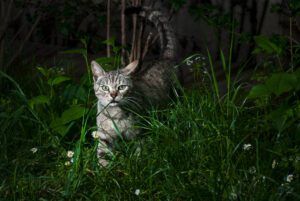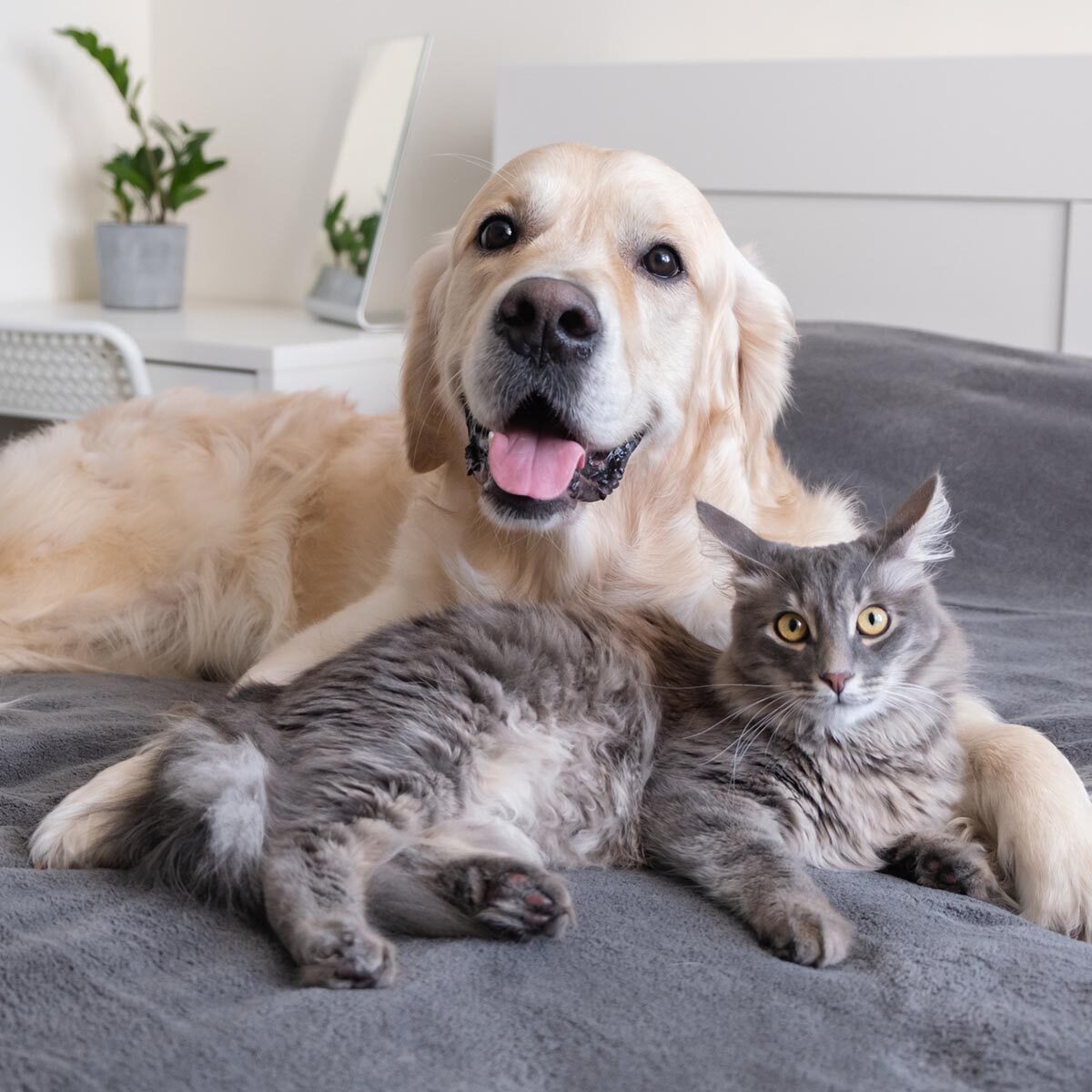Are Cats Nocturnal? Reasons Why Your Cat is Energetic at Night
Cats are different from most animals when it comes to their sleep-wake cycles, which makes them often busy at night. As a cat owner, you may find your cat’s nighttime escapades and behavior extremely frustrating, as it may also affect your sleeping schedule.
Technically, cats are not nocturnal, but you should know that cats are crepuscular. This means that they are most energetic at dusk and dawn – so their nighttime behavior is very normal.
Many cat owners spend the daytime going to work or catching up on other activities, so cats usually spend these hours relaxing and resting, especially if they are the only pet in the household. Your cat’s day begins when you arrive home, feed, and play with them. Nighttime activity is a common issue that almost every cat owner deals with – energetic play sessions on their owner’s bed or the furniture, nighttime vocalization, nibbling their owner’s toes or ears in bed, and so much more.
For you to live peacefully and enjoy your sleep at night, you need to manage your cat’s environment and shift their schedule. Some kittens are more active at night than most, but this does not make them nocturnal creatures. This article outlines some reasons your cat is energetic at night and tips to help you manage their nighttime behavior.

Why is My Cat Active at Night?
Cats have an instinct to explore, hunt, and travel at dusk and dawn, so it is no surprise that they are usually very active at nighttime. Apart from this, there can be other reasons why your cat is very energetic at night, which are explained below.
- Boredom: as stated above, most cat owners go out to school or work during the day and leave their cats home alone. So, most cats spend the daytime hours relaxing and sleeping, especially if they are the only pet in the household. If your cat spends their daytime hours alone, they might be bored, and this will cause them to require more attention, interaction, or affection at night.
Since cats are social animals, we should not rule out that they might be waking you up at night because they want your attention, want to play, or have extra energy from doing nothing all day.
- Old Age: as cats grow older, their sleeping pattern will change – it is very common for a cat’s sleeping pattern to change with old age. You may find out that your aging cat is becoming more active at night, which can sometimes result from health problems, which are a normal part of the aging process.
- Health Problems: your cat may be suffering from a health issue that may cause them to be energetic at night, so never rule out the possibility. There are some specific health conditions that may cause your cat to be vocal, uncomfortable, or hyperactive at night. Some of these health issues include anxiety, dementia, hyperthyroidism, pain, poor memory, etc.
It is normal for your cat to be active at night, but you should contact your veterinarian immediately if it becomes intense.
- Hunger: human beings sometimes get hungry in the early hours of the day, causing them to wake from their sleep and fix a snack. Your cat may wake up at night because they are hungry and want to feed – this is part of their instinct to hunt and explore at dusk and dawn as they are crepuscular creatures.
Cat Behavior Signs at Night

Your cat will display different behaviors at night when they become energetic, eventually disturbing your sleep and waking you up. These behaviors may start in the early evening and go on throughout the night.
Below are some behaviors your cat will exhibit when they become active at night.
- They may become very vocal – yowling or crying.
- Nibbling their owner’s toes in bed.
- Attacking or pouncing on their owner’s ears while they sleep.
- Energetic play across their owner or their owner’s furniture.
- Walking all over their sleeping owner.
How to Manage Your Cat’s Nighttime Behavior 
As stated above, the best way to enjoy a good night’s rest is by encouraging your cat to sleep at night and manage their environment and behavior. Remember that you should never reward your cat’s nighttime behavior, which will encourage the behavior to continue. Here are some management tips for controlling your cat’s nighttime behavior.
Take Your Cat to the Veterinarian
As stated above, health problems may be why your cat is energetic at night – if your cat’s nighttime behavior becomes intense and too much to handle, you should contact your veterinarian immediately. It is essential that you rule out any underlying health problem that may be causing your cat’s nocturnal activity. These medical issues range from behavioral issues like pain to glandular problems like thyroid disease.
Health problems like dementia and hyperthyroidism cause sleep disturbances and hyperactivity in cats at night – treating these health problems may help your cat sleep better at night. Your veterinarian may prescribe natural sleep remedies like valerian or melatonin. These medications will help your cat sleep better at night but may develop a tolerance to these medications, causing them to not work so well over time.
Provide Daytime Activity and Interaction in Your Absence
One of the reasons why your cat is energetic at night is because they were bored during the day and had nobody to play with, so they are now seeking attention. If you work all day, you should try to offer play sessions in the afternoon or early evening to meet your cat’s social and behavioral needs early in the day. You can try buying new toys or rotating your cat’s toys to keep them busy if you will not be around and when you are around, try to spend at least one hour with your cat.
When picking toys for your cat, ensure that the toys are safe for cats – avoid choosing small toys that can easily be swallowed, as this can lead to intestinal obstruction. Providing daytime activity for your cat will help expend some of their energy and the relationship between you and your furry friend. It will help to reduce your cat’s nighttime, especially if they do it for attention. Cats find it easy to form habits quickly since they are creatures of routine, so it is advisable to schedule your play sessions around the same time every day.
Feeding

If you are trying to get your cat to sleep at night, you should also try to adjust the timing of their feeding, as some cats stay awake at night because they are hungry. If your cat wakes up at an odd hour to feed and there is no food in their bowl, you can trust that your sleep will be disturbed.
You can try to offer your cat a meal earlier in the evening and another one closer to their bedtime – this way, it is highly unlikely that your cat will wake you up in the middle of the night because of hunger.
As stated above, it is a cat’s instinct to hunt for food and explore at dusk or dawn, but your cat will not exactly see it as hunting if their food bowl is always in the same spot.
You can best hide food in different places and let your cat go hunting. By the time your cat goes to all these different places in your home to look for food, they will be too tired to stay up.
You should teach your cat how to look for food first if you will be trying this method – cats are fast learners, so your cat should get the hang of it after a few sessions. Lastly, you can purchase an automatic feeder which will provide food for your cat in the middle of the night. This way, you will not need to get up to feed your cat in the middle of the night. Although, this method also requires that you teach your cat how the device works and that it is responsible for providing food.
Conclusion
The best way to reduce your cat’s nighttime activity is by enriching your cat’s environment – providing different activities to keep your cat busy during the day and prevent boredom will help them to be less energetic at night. You can provide several scratching posts, different hiding areas, and access to an outdoor enclosure, as it is advisable to allow your cat to roam freely. Remember, if your cat’s nighttime activity becomes intense, contact your veterinarian immediately.
For cat parents in the Auburndale, FL area, Auburndale Veterinary Clinic is here to care for you and your cat(s). Give us a call at (863) 967-5854 or book an appointment today!
Recent Posts
- « Previous
- 1
- 2
- 3
- Next »
About Us
Even long after they’re gone, we never forget our beloved pets. They make our families whole and bring so much joy to our lives. Our veterinarians and staff in Auburndale, FL know that the human-animal bond is sacred. To protect that bond, we aim to provide the highest level of medicine and the kindest, most compassionate care we can. Our goal is to help you help your pet stay healthy and happy for as long as possible. With wellness and preventative care, medical care for illnesses and injuries, routine surgery, dentistry and more, you can rest assured that all your pet’s needs are being met.

